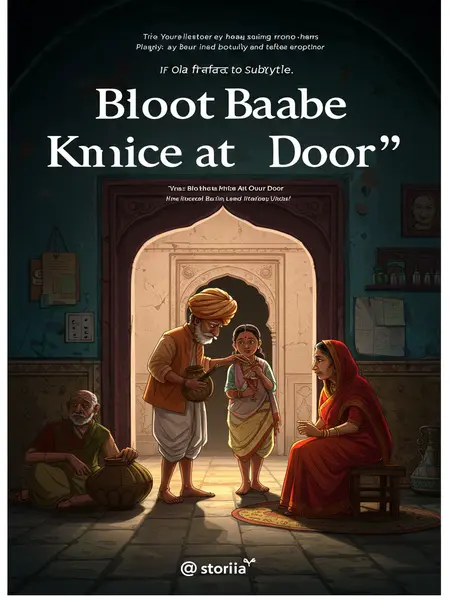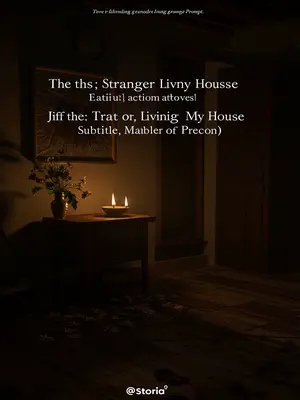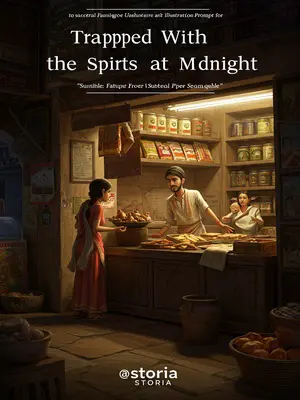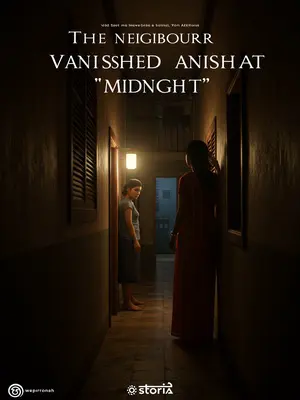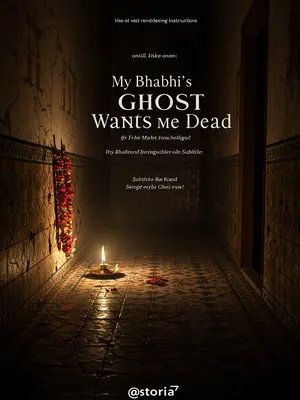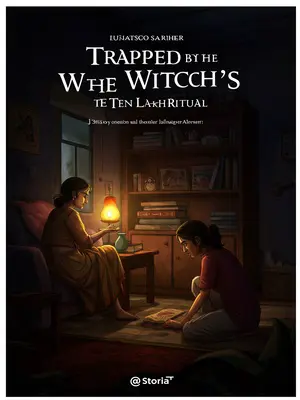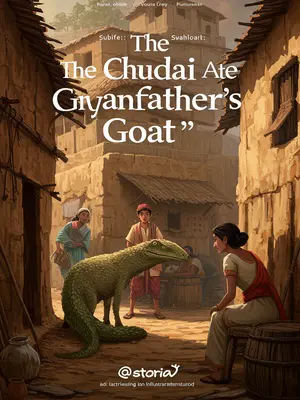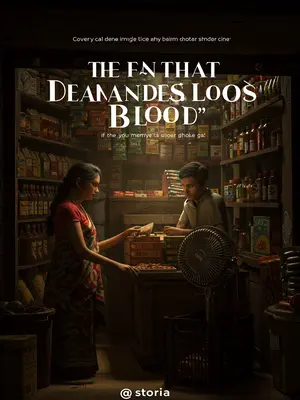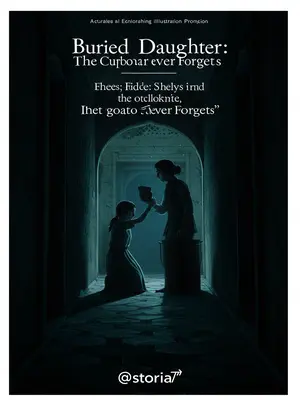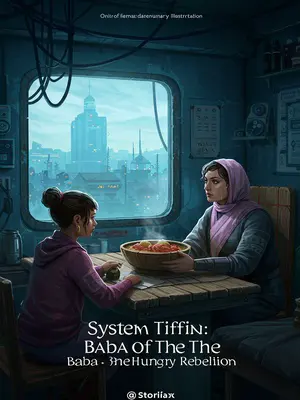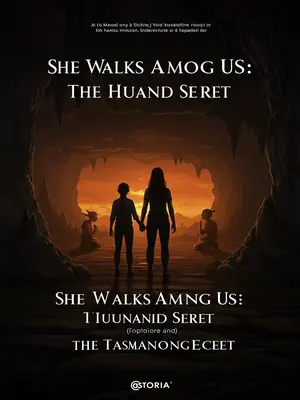Chapter 5: The Coal Pile Test
My uncle paused.
His hand froze on the bolt, eyes darting between dadi and the door. Sweat dripped down his temple.
Dadi said, “Your baba is impatient. He never knocks just three times.”
She whispered it so only we could hear. Instantly, all the old tales seemed terrifyingly real.
Hearing this, my hair stood on end.
I remembered all the times dadaji would bang the door, shouting, “Oye, koi hai?!”—always impatient, always more than three knocks.
I thought of what was said before, about Bhoot Baba propping up a straw-filled person at the door. If you open the door, whoever goes out gets eaten.
The image flashed through my mind: a hollow, lifeless figure, and the monster waiting behind.
I couldn’t stop shaking all over.
My teeth chattered, and I hugged myself, as if to hold my insides together.
The person outside grew more anxious, slapping the door so hard it sounded like thunder.
The walls seemed to vibrate with each slap. The utensils in the kitchen rattled, and a photo frame tilted on the wall.
Still dadaji’s voice: “Hurry up and open the door!”
It sounded desperate, but something about it was off—a slight rasp, a tone too urgent.
Dadi gave my uncle a look, then pointed at the ladder.
Her eyes flicked to the roof; her hand was steady. In that moment, I saw a flash of the old stories about women outsmarting demons.
My uncle understood at once. He quickly climbed up the ladder to the roof to see who was outside.
He moved quietly, peering over the parapet, breath held tight. Even the crows on the electric wires seemed to watch.
After a while, he climbed back down, his legs shaking.
His face was ashen, and he slumped against the wall, chest heaving.
“The fog is too thick. The person is standing right by the door. From the roof, you can’t see clearly. But from up there, I could see the top of a head. My baba isn’t that tall. It’s definitely not him.”
He spoke softly, but the words hit like thunder. My stomach clenched in fear.
The courtyard door was being pounded even harder. A couple more hits and it seemed it would be knocked down.
Dust drifted from the rafters, and I could see cracks spidering across the old wooden frame.
I felt my blood freeze.
I squeezed my eyes shut, silently chanting whatever prayers I could remember.
The three of us didn’t dare open the door, nor did we dare not open it.
A strange paralysis gripped us. The threat was outside, but opening the door might let it in forever.
I was so scared I could hardly breathe, and my uncle’s knees were still shaking.
I could see his lips moving in a silent prayer, “Hanuman Chalisa,” over and over again.
Dadi was the first to calm down.
She squared her shoulders, wiping her tears with the end of her sari. The matriarch was back.
She shouted towards the courtyard gate, “Old man, wait a moment!”
Her voice was steady, commanding. Even in the face of the unknown, she didn’t let fear show.
She told my uncle to hide me in the coal pile. That coal pile could cover both colour and scent.
My heart hammered as dadi piled sacks and coal over me, her hands trembling but quick. The darkness was suffocating.
“Sonu, no matter what happens, don’t make a sound, don’t come out. Bhoot Baba won’t find you,” dadi whispered to me.
Her breath was warm on my ear, and I clung to her words like a lifeline.
The person outside said, “Hurry up! If you bring Bhoot Baba over here, our whole family will die!”
The words echoed, full of dread, as if daring us to disobey.
Dadi said in terror, “We really have been targeted by Bhoot Baba.”
Her voice cracked, and for the first time, she sounded truly scared.
My uncle, holding the sickle, said in a trembling voice, “If it comes in, I’ll fight it. Ma, you take Sonu and climb over to Sharma aunty’s house.”
He tried to sound brave, but his eyes flickered with doubt. The thought of leaving the safety of our home was just as frightening.
Dadi said, “No. If Bhoot Baba gets into the house, you can’t stop it. Even if we climb over, we can’t escape. Bhoot Baba is afraid of gunpowder. Go get the firecrackers. Back then, it was only with the desi cannon that we killed it, not with knives or sticks.”
Her voice was decisive, and I remembered stories of women in our family who had once fought off dacoits with chilli powder and belan.
Luckily, it was almost Diwali, and our house had stored a lot of fireworks and firecrackers.
The boxes had been piling up for weeks, ready for the festival. Now, they were our only hope.
My uncle brought out half a courtyard’s worth.
He dumped them onto the floor, hands shaking, searching for the biggest ones.
The big gate was already shaking from being pounded.
The pounding had grown frantic, as if whatever was outside was losing patience.
A finger reached in through the crack in the door to hook the bolt.
The black finger hooked the bolt—long, burnt-looking, nothing like Dadaji’s stubby hands. I bit my tongue to keep from screaming.
That finger was pitch black.
It looked charred, almost like burnt wood, nothing like my dadaji’s brown, stubby hands.
It definitely wasn’t my dadaji’s.
I felt a scream rising in my throat, but dadi’s warning kept me silent.
I watched as it was about to hook the bolt open.
My eyes widened, heart thumping so loud I was sure everyone could hear.
At that critical moment, my uncle lit a string of chakri crackers and threw it at the door.
The sparks whirled in the air, fizzing and crackling. The acrid smoke filled the room, stinging my eyes.
With a bang, that hand instantly withdrew.
It vanished, the door slamming back against the bolt. The air buzzed with the smell of sulphur and burnt paper.
After two seconds, dadaji’s voice came from outside, “Why are you setting off firecrackers in broad daylight when it’s not even the festival?”
This time, the voice sounded more normal—impatient, slightly annoyed, just like our old man.
